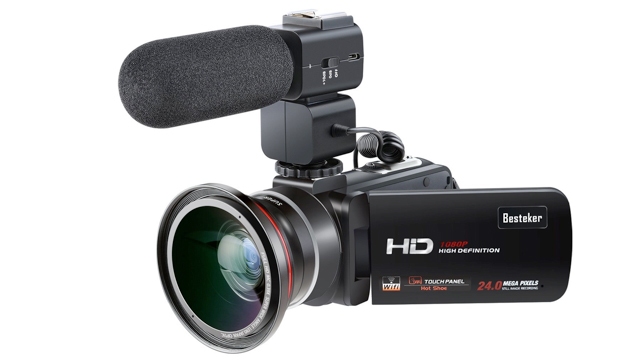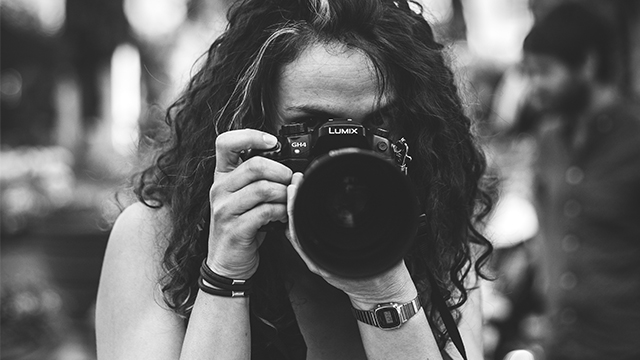Self-Taping Auditions Part 2: Acting & Editing Tips
Written by Ella Embry
May 1st, 2019
Now that you’ve read about what you need for self-taping here, what’s next? The audition itself! You’ve got auditioning for staged theatre down but how is that different behind a camera? Here’s a list of five acting for video audition tips along with five video editing tips to help you create the best audition you can.
Acting
1. Don’t look directly into the camera except to slate.

This is the same as not looking directly at the director/producers when auditioning in person. Address the camera lens directly as yourself during your slate, but make sure to look above and slightly to the left or right of the lens for your monologue. If you have one, your reader should be able to help you find a good focus spot that looks natural.
2. Focus your energy to where the camera will actually see you.

If you have a significant moment in your monologue where you stamp your foot in frustration rethink a way to bring that same intention and passion into your eyes. The camera won’t be able to see your foot stomp, but it will be able to see your eyes gloss with anger and your lip sneer.
3. Take your time & react.

No one acts in a void. Make sure you take a beat before you start your monologue to react to what starts your character’s big speech. You may be reacting to Sweeny Todd about to slit your throat or waking up to Puck’s magic love spell on you – whatever it is, make sure to take a moment to react first.
4. Create the person you’re speaking to.

Now that you’ve reacted to the other person speaking that starts your monologue, put them somewhere and keep them there. If Rosencrantz is on your left and Guildenstern on your right, then make sure to reference the right side of the camera when delivering your monologue to either character.
5. Have a good reader.

Sometimes you might need a reader to help with sides when the director wants more than just a monologue. They’ll be reading the other characters in the scene for you to react to. Try to recruit another actor friend who will be easily understood on camera and is willing to help.
Editing
6. Make sure you have the basics for a good video.

Background, lighting, sound quality – all of these things are essential when shooting an audition tape. You can shoot from home rather than rent out a studio, but you’ll need to have the right equipment. For a full list of everything, you’ll need to see our first article here!
7. Shoot how you are asked.

The default for self-taped auditions is all in landscape orientation with your slate as a full body shot and your monologue as a medium shot or a medium close up. However, some directors have different preferences, so look before you shoot. Never shoot in profile unless specifically asked.
8. Watch the time – don’t go over the limit.

Monologues typically run an exact 60 seconds, and your slate should only be a few seconds depending on how much the director asks you to include. When editing those two videos together, make sure to cut all dead space when you’re not speaking to keep it short, sweet, and to the point.
9. No fancy openings/endings.

Adding an opening curtain as a way to start your monologue and a “Fin” card to end it may sound like a fun idea, but it can be distracting, or worse give a bad first impression. Keep your editing simple, no fun frames or words running at the bottom of the screen to distract from your performance.
10. Don’t be afraid to adjust audio/lighting in post

Video editing can be daunting, especially if you’ve never done it before or don’t have any of the fancy software to help. But if for some strange reason your video looks super yellow or the audio is too quiet, try fixing it with basic video software before rearranging your entire set up and shooting again.
Need some advice? We’ve got you covered.
- 10 Tips for Being a Positive Role Model in Your Theatre Community
- 5 Ways to Say “Thank You” to Your Cast and Crew
- 5 Character Development Techniques to Use in Rehearsals
- 5 Small Ways to Get Into (And Embrace) Your Character
- 5 Ways to Take Care of Yourself During Tech Week
- Devising Theatre: 7 Quick Tips for Your First Devising Project
- “I Can’t, I Have Rehearsal”: 5 Tips for Scheduling Your Life When You’re In Theatre
- How to Make Rehearsals A Warm and Welcoming Environment
- 10 Basic Rules of Stage Combat (That Keep Everyone Safe)
- 5 Advantages of Learning Stage Combat
- Theatre Artists on a Budget: How to Be Smart and Healthy While Pinching Pennies
- Productions on a Budget: Finding Props/Costumes/Set Dressings/Set Pieces Without Breaking the Bank
- 6 Steps to Memorizing Shakespeare
- 5 Helpful Tips for Attending Callbacks
- 10 Tricks to Staying Healthy All Season Long
- How to Balance Theatre and Coursework
- 10 Items Every Actor Should Carry in Their Rehearsal Bag
- 10 Items Every Dancer Should Keep in Their Rehearsal Bag
- Discover the Delightfully Nerdy World of Dramaturgy
